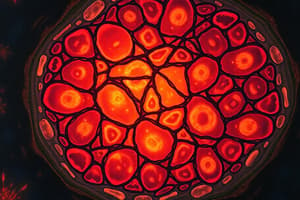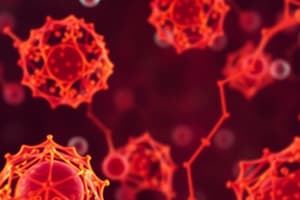Podcast
Questions and Answers
What happens during the S phase of the cell cycle?
What happens during the S phase of the cell cycle?
During the S phase, the cell duplicates its DNA, resulting in double-stranded chromosomes.
Describe the role of proto-oncogenes in cell division.
Describe the role of proto-oncogenes in cell division.
Proto-oncogenes are responsible for signaling the cell when to grow and divide.
What distinguishes benign tumors from malignant tumors?
What distinguishes benign tumors from malignant tumors?
Benign tumors do not spread and are encapsulated, while malignant tumors can metastasize and invade other tissues.
Explain the significance of the G1 phase in the cell cycle.
Explain the significance of the G1 phase in the cell cycle.
How do cancer cells differ from normal cells in their division?
How do cancer cells differ from normal cells in their division?
What is apoptosis, and why is it important in the context of cancer?
What is apoptosis, and why is it important in the context of cancer?
Describe the main events that occur during metaphase.
Describe the main events that occur during metaphase.
What typically triggers a cell to leave the G0 phase and re-enter the cell cycle?
What typically triggers a cell to leave the G0 phase and re-enter the cell cycle?
What is the function of tumor suppressor genes?
What is the function of tumor suppressor genes?
In prophase, what structural changes occur in the cell?
In prophase, what structural changes occur in the cell?
Flashcards
G1 Phase
G1 Phase
A phase within the cell cycle where the cell grows and duplicates its organelles, preparing for DNA replication. It is the first gap phase.
S Phase
S Phase
The phase in the cell cycle where the cell's DNA is replicated, resulting in two identical copies of each chromosome.
G2 Phase
G2 Phase
The phase in the cell cycle where the cell continues to grow and produce more organelles, preparing for cell division.
Mitosis
Mitosis
Signup and view all the flashcards
Karyokinesis
Karyokinesis
Signup and view all the flashcards
Cytokinesis
Cytokinesis
Signup and view all the flashcards
G0 Phase
G0 Phase
Signup and view all the flashcards
Cancer
Cancer
Signup and view all the flashcards
Proto-oncogenes
Proto-oncogenes
Signup and view all the flashcards
Tumor suppressor genes
Tumor suppressor genes
Signup and view all the flashcards
Study Notes
Cell Cycle
- Interphase: The preparatory stage for cell replication, involving three phases
- G1 phase (Gap 1): Cell growth, organelle duplication
- S phase (Synthesis): DNA replication
- G2 phase (Gap 2): Continued growth, organelle production
- Mitotic phase (M phase): Nucleus division (mitosis) followed by cell division (cytokinesis)
- G0 phase: Non-dividing state, cells perform their function.
Cancer
- Cancer: Uncontrolled abnormal cell growth.
- Cancerous cells disregard G1 checkpoints.
- Multiple mutations contribute to cancer development.
- Viral infections
- Radiation exposure
- Chemical exposure
- Inherited mutations
- Genes control cell division:
- Proto-oncogenes: Signal cell growth and division.
- Tumor suppressor genes: Checkpoints, repair, apoptosis (cell death).
- Oncogenes: Mutated proto-oncogenes that promote cancer.
- Tumors:
- Benign: Localized, enclosed by a capsule, do not spread.
- Malignant: Spread (metastasize) throughout the body.
- Metastasis: Cancer cells break off and travel.
- Characteristics of cancer cells: "Greedy little toddlers" "running red lights," irregular division, abnormal shapes.
Treatments
- Radiation: Damages cancer and surrounding healthy cells.
- Surgery: Removal of cancerous tissue, often followed by chemotherapy.
- Chemotherapy: Targets rapidly dividing cells (cancer, hair, stomach lining).
Genetics
- Chromosome Structure:
- Gene: Segment of DNA encoding a protein.
- Chromosome: DNA wrapped around histone proteins.
- Homologous chromosomes: Same genes, different alleles (one from each parent).
- Allele: Alternate form of a gene.
- Mitosis Steps (IPMATC):
- Interphase: G1, S, G2
- Prophase: Nuclear envelope breaks down, chromosomes condense. Centrioles move to opposite poles (animal cells).
- Metaphase: Chromosomes align at the metaphase plate.
- Anaphase: Sister chromatids separate.
- Telophase: Nuclei reform, cytokinesis begins.
- Cytokinesis: Cytoplasm divides.
- Cell Cycle Significance:
- Cell division produces new cells.
- Cells divide for growth, replacement, and when they receive appropriate signals.
- Necessary factors include sufficient size, nutrients, oxygen, and internal/external signals.
- Cell division produces new cells.
- Cell Cycle Control:
- Cells progress through stages based on internal and external cues.
- Cyclins (hormones) control the cell cycle checkpoints.
Cell Cycle and Mitosis
- A cell's life cycle starts from a parent cell that divides and creates 2 daughter cells via mitosis.
- Apoptosis(cell suicide) - programmed cell death.
- Chromosomes are long and extended in the G1 phase.
- The extended chromosomes look like granules called chromatin under light microscope.
- G1 phase duration varies, depending on the cell type and environment.
- Conditions for cell division: reaching a certain size, need to replace cells, sufficient resources (food and oxygen), appropriate signals.
- DNA replication occurs during the S phase.
- Organelle replication happens in the G2 phase.
- Types of Cell division
- Mitosis - eukaryote division
- Binary fission- prokaryotes division
- Cytokinesis:
- Cleavage furrow: Indentation in the cell membrane during division (animals).
- Cell plate: New cell wall forms during division (plants).
Studying That Suits You
Use AI to generate personalized quizzes and flashcards to suit your learning preferences.




